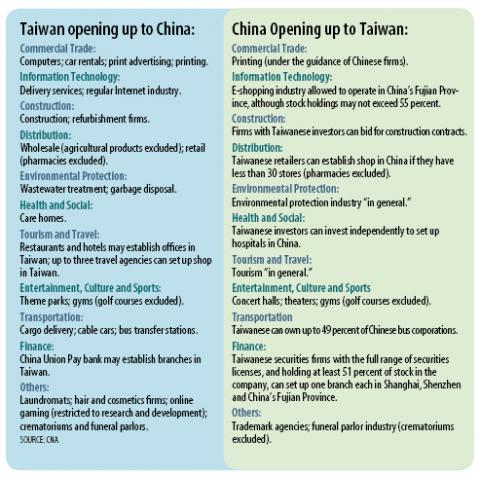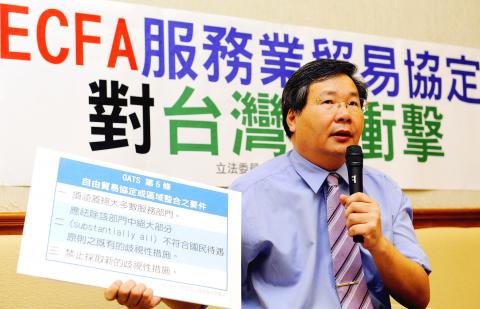The signing of a service trade agreement with China could affect issues on the legislature’s agenda during the extra session this week, after the Taiwan Solidarity Union (TSU) yesterday vowed to block all proceedings in the remaining four days.
TSU legislative caucus whip Hsu Chung-hsin (許忠信) told a press conference that the trade pact would subject local businesses to fierce competition, bring in white-collar Chinese workers, and lead to an outflow of Taiwanese expertise and knowledge to China.
The service trade agreement is one of the follow-up agreements to the Economic Cooperation Framework Agreement (ECFA) which came into effect in July 2010.

GRAPHIC: TT
Although there are more stringent restrictions on Chinese investments in certain industries covered by the service trade agreement, under WTO rules, those safeguards will have to be lifted after the end of the interim period of 10 years following the ECFA’s signing, Hsu said.
“From then on, Taiwan will be wide open to China” because limiting the number of China-funded firms, share holdings, scope of business activities and recruitment of Chinese employees would be considered a violation of the core principles of the WTO, Hsu said.
Under the agreement, China would open 80 service sectors to Taiwan, while Taiwan would open 64 sectors to China. The sectors include those related to commerce, telecommunications, construction, distribution, the environment, health, tourism, entertainment, culture, sports, transportation and finance.

Photo: George Tsorng, Taipei Times
The wide range of industries covered by the trade pact was not made public until the agreement was signed at 2pm on Friday in Shanghai.
Hsu said that financial conglomerates would benefit from the agreement because the pact would facilitate access to the Chinese banking, insurance and securities markets, but that will “come at the expense of the majority of small and medium-sized enterprises and workers in Taiwan.”
The TSU demanded that Premier Jiang Yi-huah (江宜樺) present the pact before the legislature to discuss with lawmakers how it would affect the nation, and that the deal should take effect only after the legislature approves it.
The TSU will boycott the remaining days of the extra session scheduled for next month to force the Chinese Nationalist Party (KMT) to agree to its demands, Hsu said.
During the session, the KMT had expected to pass an amendment to the Income Tax Act (所得稅法) to scrap the 8,500-point TAIEX threshold that automatically triggers the imposition of the tax on most individual investors. It also wants to pass a proposed referendum on the Fourth Nuclear Power Plant in New Taipei City’s (新北市) Gongliao District (貢寮) as well as clearing a number of other bills before the extra session ends on Thursday.
The KMT also considers the draft senior secondary education act (高級中等教育法) as urgent, considering the limited time left to prepare for the planned 12-year education scheme, set to begin in August next year.
Lawmakers across party lines on Friday called for a full and detailed examination of the signed service trade pact, with the opposition demanding that the legislature examine the deal thoroughly before deciding whether to allow it to go into effect.
KMT caucus whip Lin Hung-chih (林鴻池) yesterday said his party was not opposed to a review of the agreement by the legislature, but did not consider it necessary that Jiang present it at a question-and-answer session with lawmakers.
Lin said the KMT hoped the bills that were scheduled to be dealt with this week would not be delayed by the service trade pact issue.
Democratic Progressive Party (DPP) caucus whip Ker Chien-ming (柯建銘) asked President Ma Ying-jeou (馬英九) to step forward to address the public’s concerns.
Ker said the DPP would otherwise boycott a review of the agreement and demanded that the agreement be overruled and that Taiwan restart negotiations with China over the opening up of the service sector.

CHAOS: Iranians took to the streets playing celebratory music after reports of Khamenei’s death on Saturday, while mourners also gathered in Tehran yesterday Iranian Supreme Leader Ayatollah Ali Khamenei was killed in a major attack on Iran launched by Israel and the US, throwing the future of the Islamic republic into doubt and raising the risk of regional instability. Iranian state television and the state-run IRNA news agency announced the 86-year-old’s death early yesterday. US President Donald Trump said it gave Iranians their “greatest chance” to “take back” their country. The announcements came after a joint US and Israeli aerial bombardment that targeted Iranian military and governmental sites. Trump said the “heavy and pinpoint bombing” would continue through the week or as long

TRUST: The KMT said it respected the US’ timing and considerations, and hoped it would continue to honor its commitments to helping Taiwan bolster its defenses and deterrence US President Donald Trump is delaying a multibillion-dollar arms sale to Taiwan to ensure his visit to Beijing is successful, a New York Times report said. The weapons sales package has stalled in the US Department of State, the report said, citing US officials it did not identify. The White House has told agencies not to push forward ahead of Trump’s meeting with Chinese President Xi Jinping (習近平), it said. The two last month held a phone call to discuss trade and geopolitical flashpoints ahead of the summit. Xi raised the Taiwan issue and urged the US to handle arms sales to

State-run CPC Corp, Taiwan (CPC, 台灣中油) yesterday said that it had confirmed on Saturday night with its liquefied natural gas (LNG) and crude oil suppliers that shipments are proceeding as scheduled and that domestic supplies remain unaffected. The CPC yesterday announced the gasoline and diesel prices will rise by NT$0.2 and NT$0.4 per liter, respectively, starting Monday, citing Middle East tensions and blizzards in the eastern United States. CPC also iterated it has been reducing the proportion of crude oil imports from the Middle East and diversifying its supply sources in the past few years in response to geopolitical risks, expanding

Pro-democracy media tycoon Jimmy Lai’s (黎智英) fraud conviction and prison sentence were yesterday overturned by a Hong Kong court, in a surprise legal decision that comes soon after Lai was jailed for 20 years on a separate national security charge. Judges Jeremy Poon (潘兆初), Anthea Pang (彭寶琴) and Derek Pang (彭偉昌) said in the judgement that they allowed the appeal from Lai, and another defendant in the case, to proceed, as a lower court judge had “erred.” “The Court of Appeal gave them leave to appeal against their conviction, allowed their appeals, quashed the convictions and set aside the sentences,” the judges